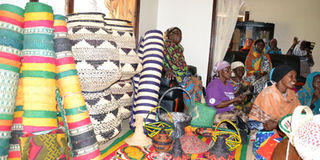Lockdown: School girls rediscover skills in craft

Paying off. Some of the crafts made by the Nubian women in Bombo Town Council, Luweero District. PHOTO/DAN WANDERA.
What you need to know:
- The market for the mats and baskets is available because they attract buyers from urban and rural areas outside Bombo.
Before the coming of formal education, most African women and girls engaged in making baskets, mats and other crafts for domestic and commercial purposes.
The modern work demands have seen this cultural practice fizzle out in many societies.
But the lockdown has seen the women among the Nubian community in Luweero District return to craft making.
The people known locally as Banubi came to Uganda in the 1880s at the time Europeans were scrambling for Africa. The Banubi were originally from Anglo-Egyptian Sudan.
Ms Zakia Umal, 82, a Nubian in Wabikokoma Ward, Bombo Town Council, which is home to thousands of her tribe mates, says she has mentored her two granddaughters aged 8 and 9 to make crafts during the lockdown.
“We do not buy the mats because these children now make different craft pieces, including the mats and baskets. They use the morning hours for the craft work and read their respective books in the evening,” Ms Umal, who moves in a wheel chair because of advanced age, says.
“As their jajja [‘grandmother’], I instruct them to ensure that they produce good pieces that are admired by many people. For the Nubians, we are deeply attached to the craft work and we rarely buy mats and baskets since we can make them ourselves,” she adds.
Her granddaughters Sanimar Swaiba and Kulthar Umal are proud of their craft.
“Basket weaving can be easy but requires concentration. Even before the Covid-19 lockdown, we had already grasped skills of basket weaving, but because we have enough time during this long home stay, we are able to make the mats that are admired by many people,” Sanimar, a pupil at Bombo Primary School, explains.
Umal, a Primary Four pupil at Happy Hours Primary School in Bombo Town, says craft making is almost part of the house chores for girls while boys engaged in other chores such as fetching water.
At Mr Abubakar Khemi’s home in Mpakawero Ward, Bombo Town Council, all the six children have been groomed to love the Nubian culture, which encourages creativity through artwork.
“As parents, we ensure that we purchase sisal, papyrus and palms that girls use to produce the craft products. It is rare to find Nubian women seated idle at home. This is the reason why we have to take advantage of the long lockdown to ensure that our children do not loiter in town,” he says.
Aisha Khemis, a Primary Six pupil, says she and her siblings have been able to produce 13 baskets and three mats in the last two months.
“We also make table clothes and shopping bags using different materials, including drinking straws, plastics, sisal and wire gauze. The craft work makes us busy but we are advised to read our books during the evening hours because we are not sure when the schools will reopen,” Aisha says.
Ms Zennah Melisella Nasur, the woman councillor representing Bombo Town Council, commends the parents among the Nubian community for grooming their children well.
“We have a unique culture among the Nubian community deeply attached to the craft works. As a district councillor and the Secretary for Education in Luweero District, I encourage parents to help the children explore their potential in craft work,” she says .
Cost
Ready market. The market for the mats and baskets is available because they attract buyers from urban and rural areas outside Bombo. The mats range between Shs8000 and Shs30,000, depending on the design and size, according to Ms Jamiyah Ssenkanja, the chairperson for Luweero District Women Council.




